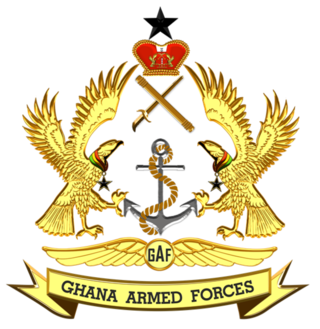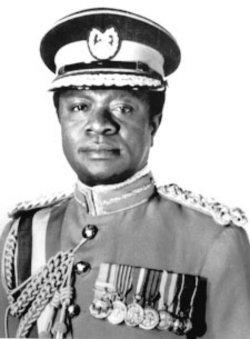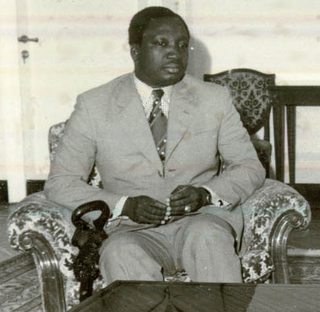
The Ghana Armed Forces (GAF) is the state military organisation of Ghana, consisting of the Army (GA), Navy (GN), and Ghana Air Force.

A commander-in-chief or supreme commander is the person who exercises supreme command and control over an armed force or a military branch. As a technical term, it refers to military competencies that reside in a country's executive leadership, a head of state, head of government, or other designated government official.

Ignatius Kutu Acheampong was a Ghanaian military officer and politician who was the military head of state of Ghana from 13 January 1972 to 5 July 1978, when he was deposed in a palace coup. He was executed by firing squad on 16 June 1979.
Lieutenant General Akwasi Amankwaa Afrifa was a Ghanaian soldier, farmer, traditional ruler and politician. He was the head of state of Ghana and leader of the military government in 1969 and then chairman of the Presidential Commission between 1969 and 1970. He continued as a farmer and political activist. He was elected a member of Parliament in 1979, but he was executed before he could take his seat. He was executed together with two other former heads of state, General Kutu Acheampong and General Fred Akuffo, and five other generals, in June 1979. He was also popularly referred to by his title Okatakyie Akwasi Amankwaa Afrifa and was in addition the abakomahene of Krobo in the Asante-Mampong Traditional Area of the Ashanti Region of Ghana.

The National Redemption Council (NRC) was the ruling Ghana military government from 13 January 1972 to 9 October 1975. Its chairman was Colonel I. K. Acheampong, who was thus also the head of state of Ghana.

The Supreme Military Council (SMC) was the ruling government of Ghana from 9 October 1975 to 4 June 1979. Its chairman was Colonel I.K. Acheampong. He was also the Head of state of Ghana due to his chairmanship.

Colonel Roger Joseph Atogetipoli Felli was a soldier and politician who was once the foreign minister of Ghana.
Colonel Kwame R. M. Baah was a soldier and politician. He was the Ghanaian foreign minister between 1972 and 1975.
Lieutenant General Albert Kwesi Ocran was a soldier and politician. He was a member of the Presidential Commission of Ghana between 1969 and 1970. He is a former Chief of the Defence Staff of the Ghana Armed Forces and was a member of the National Liberation Council (NLC) military government in Ghana.

The Chief of the Defence Staff (CDS) is the professional head of the Ghana Armed Forces. He is thus responsible for the administration and the operational control and command of the Ghana military. The CDS is a member of the Armed Forces Council. This council advice the President of Ghana on matters of policy relating to defence and also regulates the administration of the Armed Forces. It also advises the President on the promotion of all officers above the rank of Lieutenant-Colonel or its equivalent.

A referendum on the system of government was held in Ghana on 30 March 1978.

From 1966 to 1979, the nation of Ghana underwent a turbulent era as the Second Republic of Ghana. It began when the government of Kwame Nkrumah was overthrown on February 24, 1966 by a military coup.
Major General Daniel K. Addo is a former Chief of the Defence Staff of the Ghana Armed Forces. He is a Ghanaian soldier and politician.
Lieutenant General Lawrence Aboagye Okai was a Ghanaian army officer. He was the Chief of the Defence Staff of the Ghana Armed Forces. He also served on the Supreme Military Council (SMC) of the government led by General Acheampong.

The National Defence College, located in New Delhi, is the defence service training institute and highest seat of strategic learning for officers of the Defence Service and the Civil Services. This is a very prestigious course attended only by a few hand-picked defence officers of One-Star rank and civil servants of the rank of Joint secretary to the Government of India. Each year, approximately 25 officers from friendly foreign countries like the US, UK, Canada, France, Germany, Australia, Vietnam, Sri Lanka, Nepal, UAE and others attend the course.
1970s in Ghana details events of note that happened in Ghana in the years 1970 to 1979.
Air Vice Marshal John E. Odaate-Barnor was a Ghanaian airman and diplomat. He was a former Chief of Defence Staff of the Ghana Armed Forces. He served in this capacity from 7 December 1979 till 31 December 1981.
Lieutenant General Winston Mensa-Wood was a former Ghanaian military officer and served as the twenty-third Chief of Defence Staff of the Ghana Armed Forces from June 1990 to March 1992. He took over from Lieutenant General Arnold Quainoo but died in office. He was replaced by Air Marshal Achilles Harry Kwami Dumashie. Prior to that, he was Chief of Army Staff from 1987 to 1990.
Kofi Badu was a Ghanaian politician and journalist. He served as a member of parliament during Ghana's first republic and a minister of state during the Supreme Military Council (SMC) era and the Armed Forces Revolutionary Council (AFRC) era. As a journalist, he was editor for various newspapers.
Alhaji David Amadu Iddisah was a Ghanaian military officer and politician who served in various capacities in the National Redemption Council and Supreme Military Council (Ghana) governments as well as the military.






